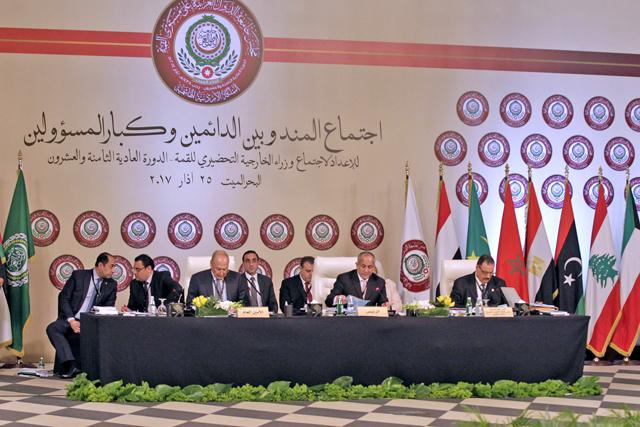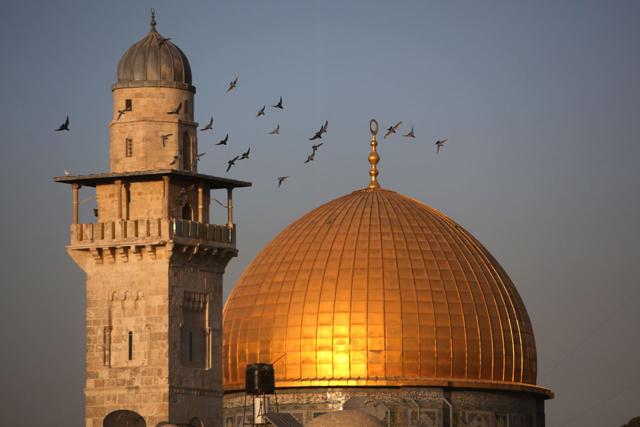You are here
Jordan’s Arab League envoy assumes presidency at representatives’ level
By JT - Mar 25,2017 - Last updated at Mar 25,2017

Jordan’s permanent representative at the Arab League Ali Ayed assumes the presidency of the Arab summit at the level of envoys at the Dead Sea on Saturday (Photo by Nader Daoud)
AMMAN — The Kingdom’s permanent representative at the Arab League Ali Ayed on Saturday received the league's presidency from his Mauritanian counterpart Widadi Ould Sidi Haiba.
The rotation took place at the opening of the meeting of Arab permanent representatives at the league as the diplomats gathered to prepare for the foreign ministers’ meeting, the Jordan News Agency, Petra, reported (see envoys’ main points of agreement in box).
During the meeting, the representatives endorsed a draft resolution presented by the Kingdom on the Syrian refugee crisis.
The suggested resolution recommends that the league, at the ministerial level, works out a mechanism to help Syria’s Arab neighbours and other Arab countries impacted by the influx of Syrian refugees.
The plan aims at sharing burdens by all league member countries, in a way that enables refugee hosts to share financial burdens and service provision.
The resolution stresses that the presence of Syrian refugees in host countries is temporary, and calls for creating proper circumstances for refugees to return to their home as soon as possible and working jointly to rehabilitate refugees to contribute to the reconstruction of their country.
The international community, especially donors, should also do their part and provide hosts with support that is proportionate to the size of burdens they are handling as a result of the humanitarian crisis, Petra added.
Another draft resolution, which concerns Palestine, underlines the Jordanian role in safeguarding and protecting Islamic and Christian holy sites in Jerusalem under the historical Hashemite custodianship of these shrines, which was reconfirmed under the agreement signed between His Majesty King Abdullah and Palestinian President Mahmoud Abbas on March 31, 2013.
Under the proposed resolution, Arab states express support for the Jordan-run Jerusalem Awqaf Department for its role in defending Al Haram Al Sharif/Al Aqsa Mosque against Israeli violations and harassment of awqaf employees, demanding Israel to stop its assaults on holy sites, according to Petra.
The declaration commends Moroccan King Mohammad VI, chairperson of the pan-Arab Jerusalem Committee, for his role in defending the holy city.
The draft resolution reiterates the centrality of the Palestinian issue for the Arab nation and the Arab identity of East Jerusalem, reaffirming the sovereignty of the State of Palestine on all Palestinian territories occupied in 1967, including East Jerusalem.
It also suggests reiteration of Arab states’ commitment to the Arab Peace Initiative, which was endorsed by Arab leaders in their Beirut Summit in 2002, and urges the international community to implement UN Security Council Resolution 2334, which labels Israeli settlements as a flagrant violation of international law, and calls on Israel to stop all settlement activities in the Palestinian lands.
The draft resolution also refuses Israel’s candidacy to UN Security Council’s membership for 2019-2020, and condemns celebrations of the centennial of Balfour Declaration in the UK, calling on the British government to recognise the Palestinian state, “especially since the UK is responsible for the suffering of the Palestinian people”.
As for UNRWA, the suggested resolution reaffirms the agency’s powers as stipulated in the UN resolution funding the relief agency, highlighting the importance of maintaining its tasks and responsibilities, without transferring any of them to other parties.
In this regard, the decision expresses Arabs’ concerns due to the widening annual deficit in UNRWA budget, reiterating the importance of sustaining financial support for the agency.
On development, the draft resolution condemns the Israeli measures aimed at harming the Palestinian economy and depriving Palestinians of their right to prosperity and development, Petra added.
Outcome of Arab League envoys meeting
The Arab League’s permanent envoys met Saturday at the Dead Sea; following are the major points of consensus:
•The importance of achieving a just and comprehensive peace based on a two-state solution that leads to the establishment of a sovereign Palestinian state within the 1967 lines, with East Jerusalem as its capital.
•The Israeli occupation embodies a true hindrance to peace efforts.
•Jordan, under the leadership of His Majesty King Abdullah, will remain the custodian of sanctuaries in Jerusalem.
•The only solution to the Syrian crisis is a political one.
•The importance of cooperation among Arab countries and Iran based on the good neighbourly ties.
•Terrorism is condemned in all its forms and must not be tied to a religion, culture or people.
•King Abdullah’s efforts to showcase the peaceful image of Islam and combat Islamophobia are appreciated, as well as his efforts to break stereotypes that attempt to link Islam to terrorism.
•The envoys suggested organising an Arab-European summit on a regular basis based on the declaration issued at the 4th Meeting of the Foreign Ministers of the European Union and the Arab League that was held in December 2016.
Source: The Jordan News Agency, Petra.
Related Articles
Jordan submitted late Monday to the UN Security Council (UNSC) the final proposal for a resolution that sets a deadline to the Israeli occupation of Palestinian territories, presented by Palestine and endorsed by 22 Arab countries.
AMMAN — Jordan voted on Thursday at the Second United Nations Committee at the draft resolution on Permanent sovereignty of the Palestinian
AMMAN — The UNESCO Executive Board on Wednesday unanimously adopted a resolution on old Jerusalem and its walls during its 214th session.For












